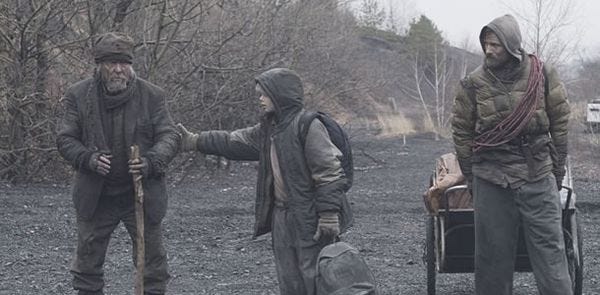The Road
What a mystery: How can a movie so spare and bleak be so emotionally rich?
Watching the blasted, gray skies and ash-covered landscape of "The Road," you wonder how this film could be anything but a fatal downer. And yet the adaptation of Cormac McCarthy's Pulitzer-winning novel about a father and son navigating a post-apocalyptic wasteland is as joyous a cinematic experience I've had this year.
Director John Hillcoat, who helmed the hard-bitten Western "The Proposition" in 2005, masterfully translates McCarthy's austere prose into an understated epic of survival and human perseverance.
In detailing the quotidian journey of a Man and Boy, who are never even given names, McCarthy often eschewed even punctuation and capitalization. Hillcoat smartly mirrors this style by having his actors underplay, and letting the screenplay by Joe Penhall find its own emotional beats without garnishing them with unnecessary flourishes.
The plot, such as it is, is minimalist. Father and young son are traveling south through the desolation to escape the icy hand of coming winter. They do not have any specific destination or purpose in mind, other than continuing to live.
As in McCarthy's book, it is left unsaid what exactly turned the earth to a cinder -- although nuclear war seems probable. The results are starkly inescapable: There is no sunshine. There are no animals. Tinder-dry trees fall and the earth heaves. Nothing will grow. The only food to be had is the detritus of an orphaned mankind.
There is a way of surviving: Cannibalism. But the father refuses to even consider this, because they're the "good guys." The boy (Kodi Smit-McPhee) and his father repeat this phrase like a mantra, or a hymn.
For a good guy, the father must undertake some pretty horrific tasks. He carries a revolver with two bullets left, which he's saving in case they're caught by the roving gangs of murderers who view them as food. The scene where he shows his son how to use the gun to kill himself -- "Make sure you point up" -- is chilling.
Viggo Mortensen expertly plays the father, a man who forces himself to give up hope and the memory of his spouse in order to concentrate on keeping the boy alive. His wife (played in flashbacks by Charlie Theron) gave up her own life, literally walking away from them, because she couldn't stand the thought of life in the aftermath.
There's a spiritual element to the tale, as in the father's admonishment to his son to "keep the fire alive," pointing at his heart. In the man's sporadic narration, it's made even more plain.
"All I know is the child is my warrant. If he is not the word of God, then God never spoke," the father says.
Their journey is episodic and compelling. At one point they lose all their meager possessions and have nothing to eat, but then stumble upon a treasure trove of wealth. They come across an ancient man (Robert Duvall) along the road who is nearly blind but sees much. They are hunted, and pursue their own quarry. Anger is unleashed; blood is shed.
And yet it's in the small moments that the film finds an aching tenderness, like when the father pulls a warm blanket off a shriveled corpse and lovingly wraps it around his shivering son. It's the understatement of "The Road" that speaks loudly.



